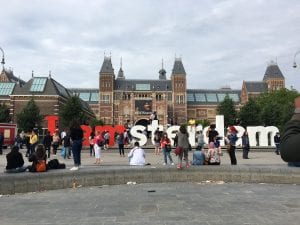Task: Post a photo of something from your summer break or an event you can remember on your portfolio. Write or record a post about it how your experiences might this link to the approaches in Psychology and conceptual understandings (Cognitive, Sociocultural, Biological.)

Over the summer, I moved from Amsterdam, the Netherlands here to Singapore, and I noticed a large amount of differences in many aspects of living. Some of these aspects were much smaller than others, but there still remained to be differences for me that I have to learn to adapt to or that I would continue to do the same as I previously had before.
The first difference was the weather: I found (and still do) the hot and humid climate of Singapore to be oppressive coming from Northern Europe, and that I was physically unable to do the same amounts of walking and outdoor activity that I could previously do without much effort. Biologically, I had climatized to the cooler and less humid weather of my previous location, making me unable to function at the same level as previously before. My body had learned to adapt to the cold, so I found that for me “summer” temperatures were approximately 20-25 degrees Celsius, and that anything above that would be “hot”, even if people here in Singapore find it to be “cold”. On the topic of walking, many locals or expats who had lived in Singapore for a period of time expressed surprise when my family would go to and from a location by walking longer distances of 1-2 kilometers. While walking such as this was very common in the Netherlands as a way of getting around narrow streets and was easier because of cooler weather, it seemed that socioculturally in Singapore, extended walking was not necessarily the preferred way of transport (if possible).
The second difference was the structure of living here: eating out and ease of access to food, driving, and pets.
When coming to Singapore, we were told that one of the largest parts of culture is food, and no one was wrong. Food here is abundant, diverse, easy to access, and cheap (depending on what and where). The attitude towards eating out seems ingrained: that never being at home is common. I wonder how one spends time with family or cooking, because in many places the culture is a home cooked meal with family, and that eating out is saved for certain occasions. Have I culturally been taught to look upon not eating at home as special? For my father, alcohol is much more expensive. It is both sociocultural and cognitive here: that alcohol isn’t the most ideal, so it is taxed in hopes that there will be a restriction on the consumption. Alcohol is much more disproved of compared to Europe, where the mentality for drinking is very open, and that it is associated with good times with family or friends.
We struggled at the beginning to adapt to driving on the left side of the road, and would constantly find ourselves having to mentally check as we crossed the road, and I would find myself subconsciously looking to the wrong side. I had cognitively written in to my brain to always look a certain direction for cars driving on the right side of the road, and was automatically following this as such. For driving, my father especially found that the style of driving was very different: socioculturally, Singaporean drivers had been taught to be very cautious, and my father found that many drivers are extremely cautious on the freeways, driving below the speed limit written. They had simply been taught differently: to prioritize safety and to always remember that they are in control of a vehicle.
When applying for our dog to come into the country, we faced many restrictions for the size and breed of our dog. And when we arrived, we found the attitude of many locals towards large dogs was fear. People would give our dog a wide berth, avoiding him even if he wasn’t interested in others. While my parents find it odd, I find it to be very ingrained into the culture of many regions in Asia, that certain dogs are very dangerous and should be avoided. Biologically, humans have fears wolves as being dangerous, and our fears are often designed to protect us. Perhaps the avoidance is just a biological response.
It’s the simple things, isn’t it?
Has it been easy to transition? Not necessarily. But am I able to understand why I struggle? Yes. I think that if I looked hard enough, I can justify everything that I think and feel about moving here, and that there is always a connection to the way it makes me act.